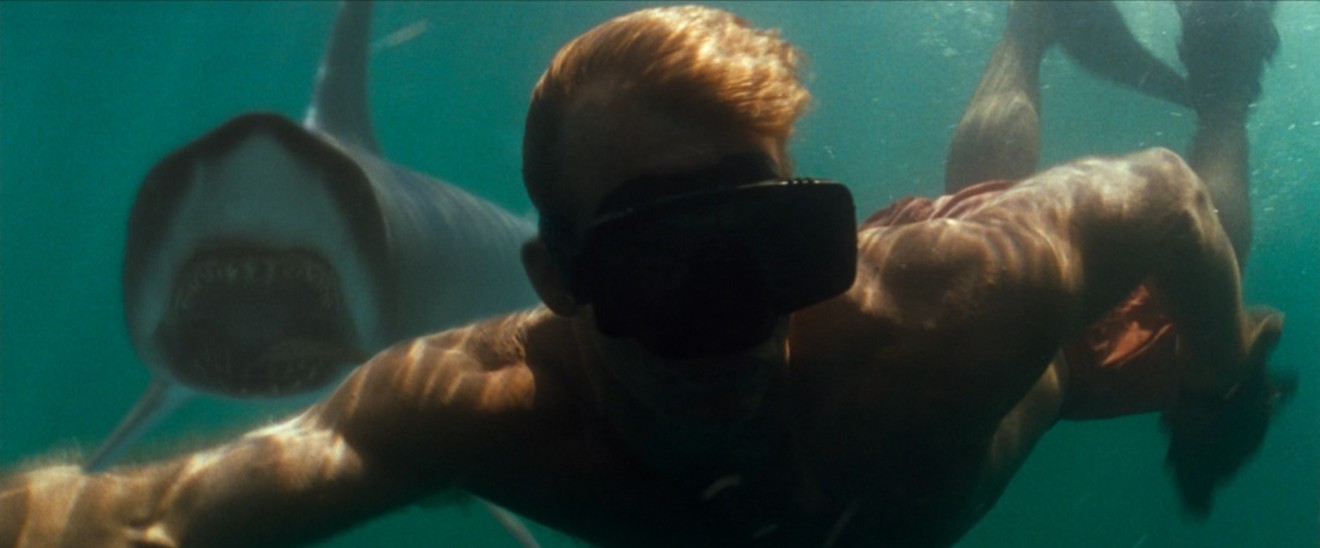And hard as it may be to believe in an era of Sharknados and cinematic Megalodons, but in 1999 it had been 12 years since the release of a major Hollywood shark movie.
In what is basically the opposite of coincidence, it was also 12 years since the Jaws: The Revenge dropped into theaters with a sodden thud. People are prone to hyperbole when they don't like something, but the 4th (and mercifully final) Jaws movie really was so singularly terrible it effectively killed the "first wave" of shark flicks (initiated by the Spielberg original) stone dead. It also fouled the waters (so to speak) for any other shark movies for more than a decade. Deep Blue Sea ended this drought, and — for better or worse — kicked off the veritable deluge of shark movies that have been released on a steady basis (both in theaters and on cable) pretty much to the present day.
Interestingly, DBS wasn’t even the first giant aquatic predator movie of that year. Lake Placid came out a month earlier, marking a similar (if smaller scale) renaissance in giant crocodilians, which have never been as cinematically celebrated, despite killing more people on an annual basis. Hell, even hippos kill more people than sharks, around 500 a year, but you won’t see Hippo: Tusks of Doom any time soon because we still can't look at them without thinking of that stupid game.
Anyway, Deep Blue Sea takes place in an oceanic research facility called Aquatica, where a team of scientists led by Jim Whitlock (Stellan Skarsgård) are experimenting on sharks in order to find a cure for Alzheimer’s. A noble cause, to be sure, but not when you’ve genetically enhanced the sharks' brains, taking “God's oldest killing machine and [giving] it will and desire,” as-hero-with-a-past Carter (Thomas Jane) puts it. I don't know about you, but his revealing that sharks killed all the firstborn of Egypt was pretty surprising.
The newly smart sharks quickly decide they’re sick of humans sticking giant needles in their heads, kill Whitlock (see above), and commence to flood the station in order to cause its collapse, thus lowering the barrier fences that prevent them from escaping to — you guessed it — the abyssal indigo ocean.
Though she’s technically Whitlock's subordinate, the movie’s primary bad guy is Dr. Susan McCallister, played by Saffron Burrows. Fun fact: her character was originally going to survive, but test audiences were so pissed at what they saw as the movie’s villain not only surviving but getting the guy (spoiler alert for a 19-year old movie), that the ending had to be rewritten. In the film's climax, McCallister now lures the escaping shark back with her own blood and is promptly eaten. Meanwhile LL Cool J’s cook character Preacher survives and enjoys a long kiss with Thomas Jane.
That doesn't actually happen, but that outcome is the only way his end credits song ("Deepest Bluest") really makes sense (and if you've never watched the music video before, bon appétit).
McCallister’s motivation for violating the Harvard Compact on Genetics (not a real thing!) is poignant, but also foreshadows her innate evil. To wit:
Dr. McCallister: Tell me Mr. Franklin, have you ever known anyone with Alzheimer's?Back up a sec: why would you tell him she’s dead? Tell your old man she’s out shopping or in Barbados or *any* other fucking thing and give the guy some peace of mind, devil woman.
Russell Franklin: Well, no.
Dr. McCallister: By the end all my father could do was ask why my mother wasn't at home, and each time I told him she was dead I had to watch him take that loss like a car wreck. 200,000 men and women develop Alzheimer's each year! What if you could end all that suffering with a single pill?
Deep Blue Sea also gave us two of the most outrageous moments in recent movie history: the death of Samuel L. Jackson’s character (the aforementioned Russell Franklin) and Michael Rapaport as a physicist. We won’t go into the latter, because even relatively sedate Rapaport is too much, and his toothy demise comes as something of a relief. Franklin’s death, on the other hand, comes as the corporate magnate is giving what we’re supposed to interpret as a rousing monologue: the horror equivalent of Tripper’s “It just doesn’t matter!” speech in Meatballs, only imagine if a bear lunged through the window of the Camp North Star lodge and dismembered Bill Murray in front of dozens of horrified children.
Jackson’s death scene immediately lifts DBS into cult classic territory, and the reestablishment of sharks as terrifying monsters singularly focused on biting your limbs off (inaccurate as that may be) is credit to director Renny Harlin’s horror for horror’s sake approach. Deep Blue Sea represented a (you’ll pardon the pun) sink or swim proposition for the Die Hard 2 director, who’d followed that movie up with Cliffhanger (a modest success), Cutthroat Island, and The Long Kiss Goodnight (an abject bomb and a box office disappointment, respectively). Deep Blue Sea wouldn’t salvage the director’s reputation, and he was last seen directing a Chinese Jackie Chan/Johnny Knoxville team-up and that non-Dwayne Johnson Hercules movie.
Despite sitting at 56 percent “Fresh” on Rotten Tomatoes, Deep Blue Sea is widely considered one of the better shark movies out there. Of course, after Jaws, Open Water, and maybe The Shallows, it's a pretty steep drop, speaking more to the relatively low median quality of a genre diluted by titles like Sharks in Venice (Stephen Baldwin!), Ghost Shark (GHOST SHAAARK!), and Discovery Channel’s increasingly ludicrous Shark Week (which inexplicably celebrates its 30th anniversary this year). All things which, ironically enough, the success of Deep Blue Sea made possible.










